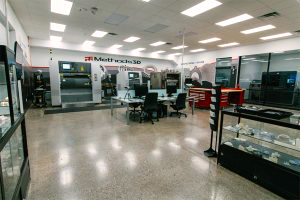Methods 3D expands with new AM labs
Methods 3D expands with new AM labs
Methods 3D, Inc., a newly formed subsidiary of Methods Machine Tools, Inc., continues to broaden its presence in 3D printing through the completion of seven additive manufacturing laboratories strategically located across the U.S. The labs are outfitted with printers capable of Direct Metal Printing (DMP), Select Laser Sintering (SLS), Stereolithography (SLA) and Multi-Jet, running 14 different materials.

Methods 3D, Inc., a newly formed subsidiary of Methods Machine Tools, Inc. (Sudbury, Mass.), continues to broaden its presence in 3D printing through the completion of seven additive manufacturing laboratories strategically located across the U.S.
At IMTS 2016 Methods 3D introduced new advancements in 3D technology via an integrated production cell, made compelling presentations and showcased the very latest in 3D printing systems. Methods 3D has also added personnel to support its new infrastructure, and Mr. James Hanson was appointed as Chief Operating Officer.
At IMTS, the packed Methods 3D booth featured an innovative new concept demonstrating how 3D technology can be deployed in an automated production cell environment. 3D System's modular 'Figure 4" cell was operating lights-out with Fanuc robotic arms, mass-producing multiple parts. "Figure 4" is 3DS' new high speed SLA technology capable of generating parts up to 50 times faster than typical SLA printers.
Discrete modules in the system enable automation to pass 3D printed parts from design to printing to washing, curing and final finishing, all without human involvement. At the IMTS Additive Manufacturing Conference, Methods 3D General Manager Ben Fisk presented "The Integration of Additive Manufacturing with Traditional Machining" to a throng of almost 500 attendees, while 3D Systems CEO Vyomesh Joshi highlighted Methods 3D at their IMTS presentation as a key strategic partner for the implementation of Additive Manufacturing solutions into production.
Methods 3D advanced new additive manufacturing labs are outfitted with 18 printers including Direct Metal Printing (DMP), Select Laser Sintering (SLS), Stereolithography (SLA) and Multi-Jet models running 14 different materials. A full complement of post-processing equipment such as EDM, CNC machining, automation and inspection is also onsite and each location is fully staffed by a dedicated team of sales, application engineers and service technicians. The additive manufacturing labs are in each of Methods Machine Tools' technology centers including Sudbury, MA (Boston) headquarters; Detroit, MI; Charlotte, NC; Chicago, IL; Phoenix, AZ; San Francisco, CA; and Los Angeles, CA.
"Our new additive labs are ideal for manufacturing professionals to consult our experts and explore ways to design and produce their components using the latest 3D technology integrated with conventional machining, automation and more," Hanson stated. "Engineers have been bringing their application challenges to us and we have been working with them to implement this technology into their manufacturing operations"
Before his recent appointment as Methods 3D COO, Hanson was director, corporate development at Methods Machine Tools, Inc. from 2007 through 2015. Relishing his new role at Methods 3D he added, "By partnering with 3D Systems, whose core competencies complement Methods' suite of metalworking machining and automation solutions, we will provide our customers the most advanced 3D printing available, in addition to the highest level of service, support and solutions that Methods Machine Tools is known for. We are at the front end of this innovative technology that is poised to grow exponentially." Hanson considers the latest developments from 3D Systems and in particular, Figure 4, "a game changer".
In October 2015, Methods Machine Tools announced it entered into a partner agreement with 3D Systems, a provider of the most advanced and comprehensive 3D digital design and fabrication solutions available today, including 3D printers, print materials and cloud-sourced custom parts.
Methods 3D, Inc. is comprised of a dedicated team of industry experienced, highly-skilled technical sales and applications engineers fully integrated with, and leveraging, the extensive machining and manufacturing experience of Methods Machine Tools, Inc. This partnership enhances Methods' portfolio of leading-edge precision machine tools and solutions for traditional manufacturing with advanced 3D printing solutions, enabling their customers to enter new markets, expand their manufacturing capabilities, and revolutionize manufacturing with 3D printing.
Methods Machine Tools, Inc., in operation for nearly 60 years, is a leading supplier of precision machine tools, 3D printing solutions, automation and accessories, providing extensive applications engineering support, installation, parts, service and training through a network of large state-of-the-art technology centers and dealers throughout North America. For more information, please contact Methods at 65 Union Avenue, Sudbury, MA 01776, TEL: (978) 443-5388, FAX: (978) 440-9405 or visit their website at www.methodsmachine.com.
—Methods Machine Tools (News Release)





